The Gift of Giving Back
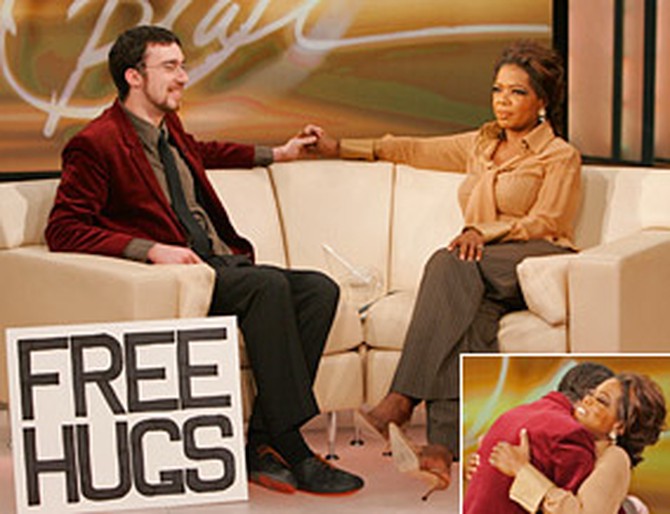
One man looking for some cheer down under has started a worldwide movement—by simply offering free hugs!
Juan Mann's free hug campaign started two years ago when Juan went back to his hometown in Australia to find that his friends and family had moved away. "I was the only person I knew in my own hometown," he says. "So I wanted to get out there and do something that spread a little bit of cheer and cheered me up, and this was the first thing that really came to mind."
The first time he stood in public with his "Free Hugs" sign, Juan says it took an agonizing 15 minutes to receive his first hug. "This one lady came up and gave me a hug and it was really, really worth it," Juan says. From that first hug a campaign was born! Thanks to a video on the website YouTube, Juan's movement is spreading worldwide—he is even organizing a global hug day!
So do people think he's crazy? "All the time," Juan says. "People tend to be a bit wary of strange men in velvet coats walking around with giant signs."
Juan Mann's free hug campaign started two years ago when Juan went back to his hometown in Australia to find that his friends and family had moved away. "I was the only person I knew in my own hometown," he says. "So I wanted to get out there and do something that spread a little bit of cheer and cheered me up, and this was the first thing that really came to mind."
The first time he stood in public with his "Free Hugs" sign, Juan says it took an agonizing 15 minutes to receive his first hug. "This one lady came up and gave me a hug and it was really, really worth it," Juan says. From that first hug a campaign was born! Thanks to a video on the website YouTube, Juan's movement is spreading worldwide—he is even organizing a global hug day!
So do people think he's crazy? "All the time," Juan says. "People tend to be a bit wary of strange men in velvet coats walking around with giant signs."
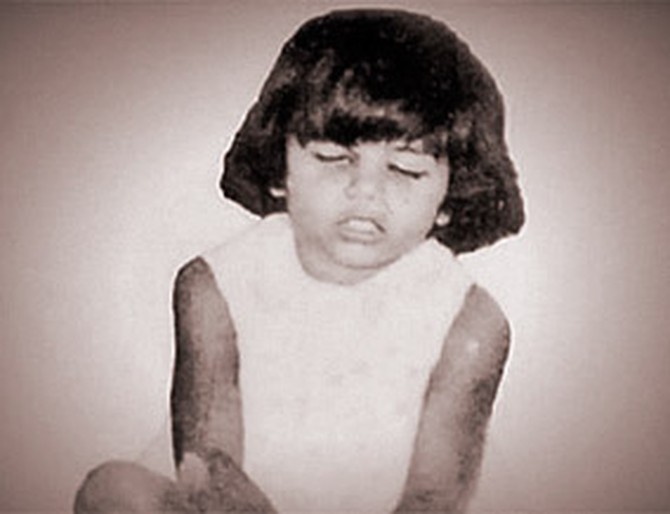
One woman has turned a traumatic childhood into a life full of hope. For the first seven years of her life, Rani lived a poor, but happy, life in Southern India. At age 7, a village leader offered Rani a more comfortable life after her sick father could no longer provide for his large family. The woman said Rani's mother could visit, and the family agreed.
Shortly after being turned over to the village leaders, Rani was sold into child slavery. "I cried and cried for my mom and she didn't come," Rani says. "I remember those feelings of pain and isolation and just loneliness."
Rani stayed with her owner for about nine months. She was traumatized by daily beatings, torture and starvation and has blocked memories of the most violent episodes. "I felt like I did want to die," she says. "What is there to live for? Why would you want to live in a life of beatings?"
Because Rani says she looked like she was physically and mentally ill, her owner couldn't make a profit. He sold her in an illegal international adoption—a blessing in disguise. Rani was adopted in America. "My adoptive mom was the best person. This woman just gave me everything she had," she says.
Shortly after being turned over to the village leaders, Rani was sold into child slavery. "I cried and cried for my mom and she didn't come," Rani says. "I remember those feelings of pain and isolation and just loneliness."
Rani stayed with her owner for about nine months. She was traumatized by daily beatings, torture and starvation and has blocked memories of the most violent episodes. "I felt like I did want to die," she says. "What is there to live for? Why would you want to live in a life of beatings?"
Because Rani says she looked like she was physically and mentally ill, her owner couldn't make a profit. He sold her in an illegal international adoption—a blessing in disguise. Rani was adopted in America. "My adoptive mom was the best person. This woman just gave me everything she had," she says.
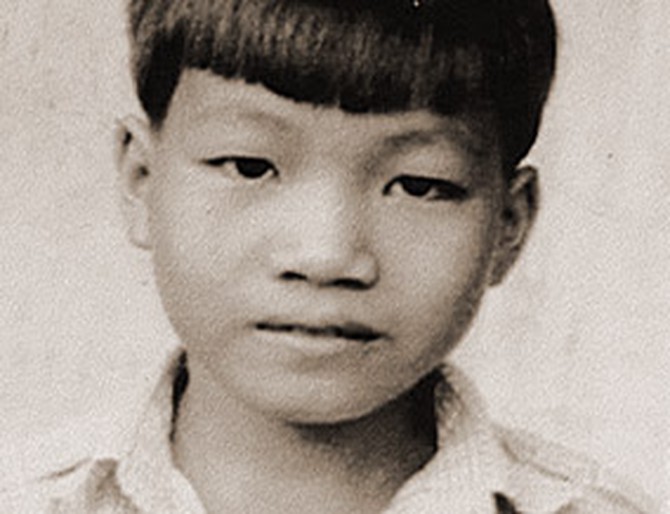
While Rani was struggling for freedom, another child was facing his own nightmare. In 1978, three years after the fall of Saigon, the Communist Army in Vietnam started recruiting young boys as child soldiers.
Trong's father was certain his 9-year-old son was about to be enlisted. "My dad, at his desperation, he [sent] me out on a boat to escape Vietnam," Trong says. "[He thought], if he sent me away, I [would] have a better chance to survive."
Trong was cast out into the South China Sea on a dangerously crowded boat, terrified and alone. When they ran out of water, people began panicking and jumping off the boat to commit suicide. The real danger came when modern-day pirates attacked the boat looking for gold and silver. "I witnessed the women being raped. They just take the babies, [and threw them] overboard. It just [made] my heart break. My body just shut down," Trong says.
Days later he says the ship hit ground and began to sink. Trong says he swam to the nearest island and used a cave as shelter. Six months later, Trong was rescued by the Indonesian government and placed in a refugee camp. After two years in the camp, Trong finally found salvation when a Seattle family became his sponsor and moved him to the United States.
Trong's father was certain his 9-year-old son was about to be enlisted. "My dad, at his desperation, he [sent] me out on a boat to escape Vietnam," Trong says. "[He thought], if he sent me away, I [would] have a better chance to survive."
Trong was cast out into the South China Sea on a dangerously crowded boat, terrified and alone. When they ran out of water, people began panicking and jumping off the boat to commit suicide. The real danger came when modern-day pirates attacked the boat looking for gold and silver. "I witnessed the women being raped. They just take the babies, [and threw them] overboard. It just [made] my heart break. My body just shut down," Trong says.
Days later he says the ship hit ground and began to sink. Trong says he swam to the nearest island and used a cave as shelter. Six months later, Trong was rescued by the Indonesian government and placed in a refugee camp. After two years in the camp, Trong finally found salvation when a Seattle family became his sponsor and moved him to the United States.
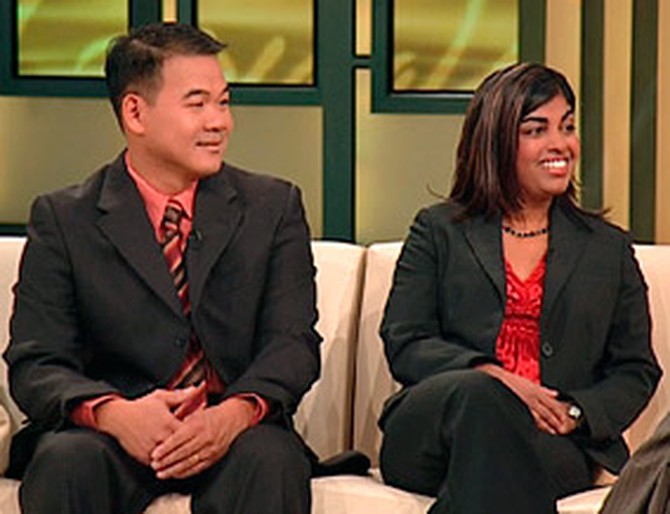
Rani and Trong both thrived in their new homes. Years later, they met on a blind date. "I had a hard time trusting anybody. But after time, I saw his tenderness and that's what I fell in love with," Rani says.
Rani says she didn't learn about her husband's past until after they were married. "He was so traumatized and ... he hadn't found somebody throughout life to talk to," she says. "So once we got married, he felt comfortable and open."
Today, Rani and Trong are living the life they once thought was impossible. They have four children and a successful business building luxury homes in Olympia, Washington. They are using the profits from their business to help others.
Their non-profit organization, The Tronie Foundation, helps build shelters for children and women who are the victims of abuse or trafficking all around the world. "We've had past experiences, but we just don't want it to go to waste. We believe there's something we can do with it," Rani says. "For us, it's helping to build shelters for victimized children around the world."
Rani says she didn't learn about her husband's past until after they were married. "He was so traumatized and ... he hadn't found somebody throughout life to talk to," she says. "So once we got married, he felt comfortable and open."
Today, Rani and Trong are living the life they once thought was impossible. They have four children and a successful business building luxury homes in Olympia, Washington. They are using the profits from their business to help others.
Their non-profit organization, The Tronie Foundation, helps build shelters for children and women who are the victims of abuse or trafficking all around the world. "We've had past experiences, but we just don't want it to go to waste. We believe there's something we can do with it," Rani says. "For us, it's helping to build shelters for victimized children around the world."
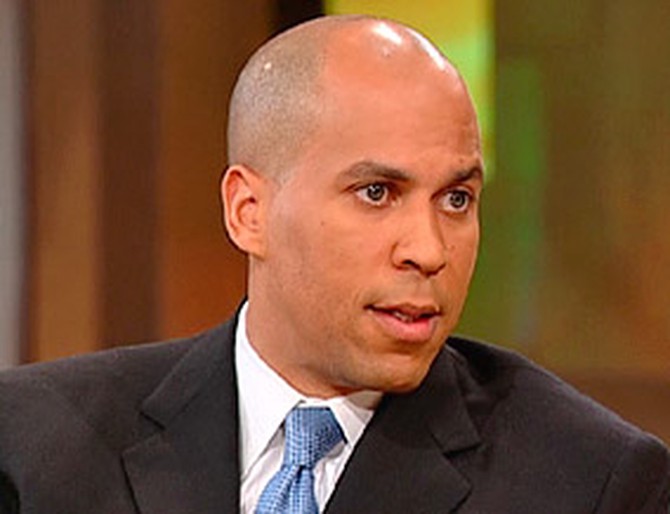
Cory Booker may seem like your average politician, but Oprah says this young mayor has the tenacity to truly make a difference.
Raised in a wealthy suburb, this New Jersey native received degrees from Stanford, Oxford and Yale Law School. Then, his life took an unexpected turn. He gave up a high-paying corporate job to run for mayor of Newark, New Jersey—a small city with a high crime rate.
Despite his relentless pursuit, he lost the first election. Then, four years later, he ran again and won. On July 11, 2006, Cory Booker became the 36th mayor of Newark.
"I feel like this is my calling," he says. "How lucky is it in life to be able to wake up in the morning and feel like you're doing what you were meant to do, with people who inspire you every single day?"
Unlike most politicians, Mayor Booker doesn't live in a big house in an exclusive neighborhood. He calls one of Newark's poorest housing projects home.
Raised in a wealthy suburb, this New Jersey native received degrees from Stanford, Oxford and Yale Law School. Then, his life took an unexpected turn. He gave up a high-paying corporate job to run for mayor of Newark, New Jersey—a small city with a high crime rate.
Despite his relentless pursuit, he lost the first election. Then, four years later, he ran again and won. On July 11, 2006, Cory Booker became the 36th mayor of Newark.
"I feel like this is my calling," he says. "How lucky is it in life to be able to wake up in the morning and feel like you're doing what you were meant to do, with people who inspire you every single day?"
Unlike most politicians, Mayor Booker doesn't live in a big house in an exclusive neighborhood. He calls one of Newark's poorest housing projects home.
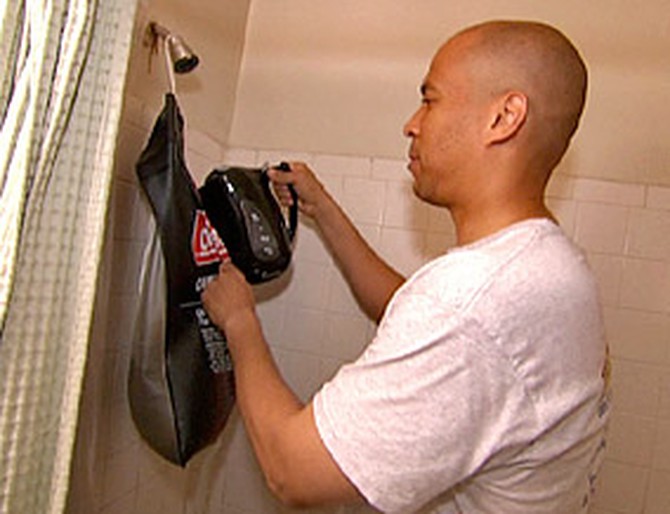
For the past eight years, Mayor Booker has lived in Brick Towers, a housing project in one of Newark's most violent neighborhoods. Though the Housing Authority has declared his apartment building "unlivable," Mayor Booker wanted to live like the people who need him most.
Currently, no one in the building has hot water. Every morning, the mayor warms water in an electric kettle and pours it into a portable camping shower. This is the only way he can take a hot shower. "Sometimes you spill boiling water on your hand," he says. "That's why sometimes it's an incentive to [shower] the cold way. ... We have senior citizens that are bathing this way. It's just not right."
When the elevators aren't working, Mayor Booker has to climb 16 flights of steps to his apartment, but his most pressing concern is the lack of heat. "This winter there will be no heat again so we're moving with great speed to get the residents to nice places," he says.
Although Mayor Booker was once a Rhodes Scholar, he says he's learned the most valuable lessons in life from his neighbors. "I always say I got my B.A. from Stanford, but my PhD in the streets of Newark," he says. "These are some of the most heroic people I've ever met. ... They've strengthened me. They've fortified me. They gave me a reason for living and taught me some of my best lessons. I've been the fortunate one in many ways."
Currently, no one in the building has hot water. Every morning, the mayor warms water in an electric kettle and pours it into a portable camping shower. This is the only way he can take a hot shower. "Sometimes you spill boiling water on your hand," he says. "That's why sometimes it's an incentive to [shower] the cold way. ... We have senior citizens that are bathing this way. It's just not right."
When the elevators aren't working, Mayor Booker has to climb 16 flights of steps to his apartment, but his most pressing concern is the lack of heat. "This winter there will be no heat again so we're moving with great speed to get the residents to nice places," he says.
Although Mayor Booker was once a Rhodes Scholar, he says he's learned the most valuable lessons in life from his neighbors. "I always say I got my B.A. from Stanford, but my PhD in the streets of Newark," he says. "These are some of the most heroic people I've ever met. ... They've strengthened me. They've fortified me. They gave me a reason for living and taught me some of my best lessons. I've been the fortunate one in many ways."
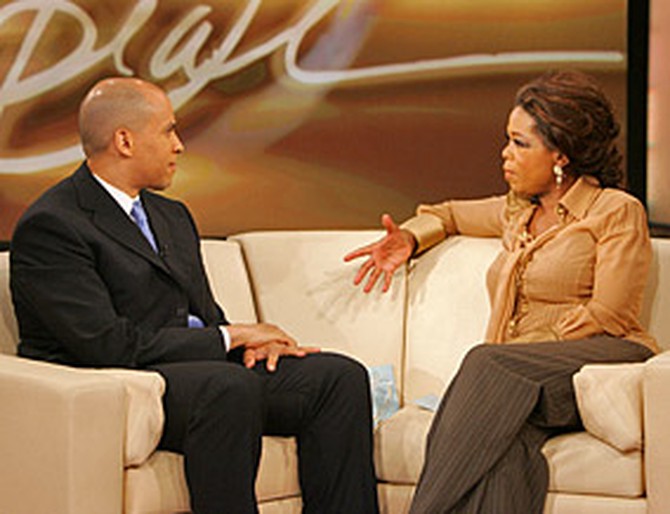
In October 2006, Mayor Booker celebrated his 100th day in office. Critics have called him "too idealistic," but the mission statement he set forth on day one remains the same. "We are going to make Newark, New Jersey, the national example of urban transformation," he says.
Recently, Mayor Booker began mentoring two teenagers who allegedly wrote "Kill Cory Booker" on a wall. He says he made a pledge to these teens that if they live up to certain standards, he'll live up to their expectations.
The teens accompany him to bookstores, movies and restaurants, but they must abide by the mayor's strict rules. "The first thing I said is, 'You've got to dress properly. You've got to cut your hair. ... People judge you on how you present yourself,'" he says. "'And you have to speak proper English. I can't deal with the double negatives and the slang. You have to speak the English of Frederick Douglas, W.E.B. DuBois [and] Booker T. Washington.'"
Despite a few setbacks—like dealing with death threats—Mayor Booker believes he can turn his city around. "I'm in this fight, and we can do it," he says. "This country's whole history is a perpetual testimony to the achievement of the impossible."
Recently, Mayor Booker began mentoring two teenagers who allegedly wrote "Kill Cory Booker" on a wall. He says he made a pledge to these teens that if they live up to certain standards, he'll live up to their expectations.
The teens accompany him to bookstores, movies and restaurants, but they must abide by the mayor's strict rules. "The first thing I said is, 'You've got to dress properly. You've got to cut your hair. ... People judge you on how you present yourself,'" he says. "'And you have to speak proper English. I can't deal with the double negatives and the slang. You have to speak the English of Frederick Douglas, W.E.B. DuBois [and] Booker T. Washington.'"
Despite a few setbacks—like dealing with death threats—Mayor Booker believes he can turn his city around. "I'm in this fight, and we can do it," he says. "This country's whole history is a perpetual testimony to the achievement of the impossible."
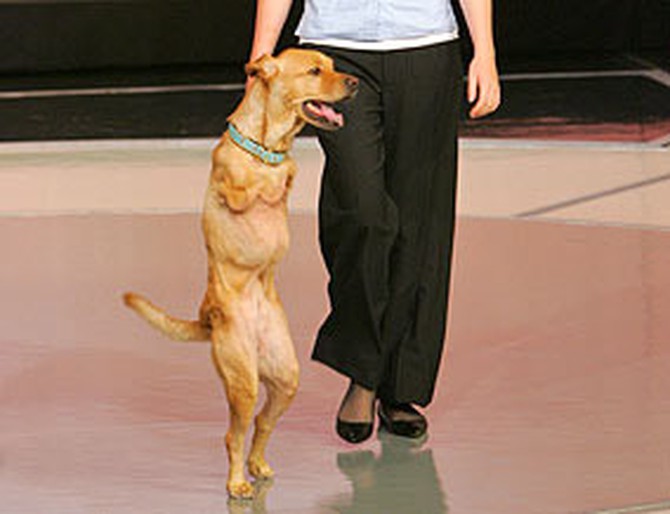
Oprah has interviewed thousands of guests over the past 21 seasons, but she says she'll never forget Faith, a dog who overcame great odds and brought hope to millions.
Born with severely deformed front legs, Faith was rescued by the Stringfellow family after the mother dog was found trying to smother her. Faith could only move by dragging herself along the floor, a habit the veterinarian said would rub a hole in her chest and chin. Although their vet recommended they put Faith down, the family chose to give her a home.
The family used spoonfuls of peanut butter to train Faith to walk on her two hind legs—like a human!
Watch Faith the Dog walk!
Faith is one of Oprah's all-time favorite stories of hope. "She is a demonstration of what it looks like to persevere—what it feels like to say, 'I can do what I want to do. Nothing can stop me,'" Oprah says.
While visiting South Africa, Oprah says a young girl came up to her and said, "I loved your show with the dog with two legs because he made me believe I can do anything."
Born with severely deformed front legs, Faith was rescued by the Stringfellow family after the mother dog was found trying to smother her. Faith could only move by dragging herself along the floor, a habit the veterinarian said would rub a hole in her chest and chin. Although their vet recommended they put Faith down, the family chose to give her a home.
The family used spoonfuls of peanut butter to train Faith to walk on her two hind legs—like a human!
Watch Faith the Dog walk!
Faith is one of Oprah's all-time favorite stories of hope. "She is a demonstration of what it looks like to persevere—what it feels like to say, 'I can do what I want to do. Nothing can stop me,'" Oprah says.
While visiting South Africa, Oprah says a young girl came up to her and said, "I loved your show with the dog with two legs because he made me believe I can do anything."
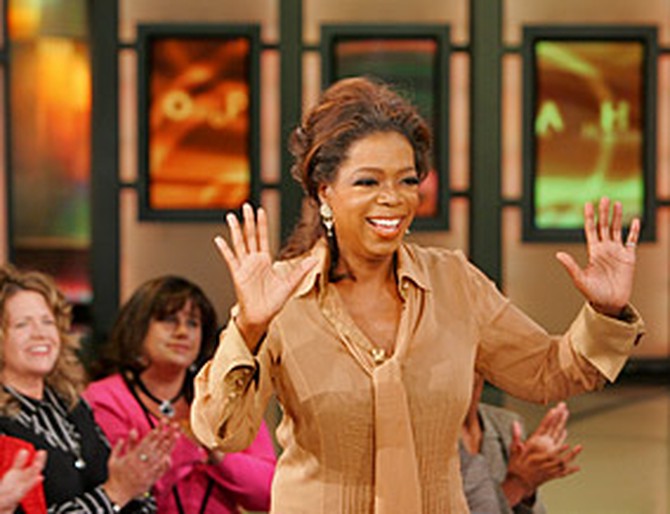
Over the years, Oprah has given away cars, homes and much more, but nothing compares to today's giveaway! "I can honestly say that every gift I've ever given has brought at least as much happiness to me as it has to the person I've given it to," Oprah says. "That's the feeling I want to pass on to you."
Every member of Oprah's audience is going home with $1,000 and a Sony DVD Handycam...but there's a catch. Oprah is challenging more than 300 audience members to donate their money to a charitable cause.
"You're going to open your hearts, you're going to be really creative, and you're going to spend it all at once on one stranger or spend a dollar on every person," she says. "Imagine the love and kindness you can spread with $1,000."
The audience members can't spend their money on family members, and they'll be videotaping their stories for a future show. They only have one week to come up with a plan for their money!
Check back soon for an update and to watch video submissions!
Every member of Oprah's audience is going home with $1,000 and a Sony DVD Handycam...but there's a catch. Oprah is challenging more than 300 audience members to donate their money to a charitable cause.
"You're going to open your hearts, you're going to be really creative, and you're going to spend it all at once on one stranger or spend a dollar on every person," she says. "Imagine the love and kindness you can spread with $1,000."
The audience members can't spend their money on family members, and they'll be videotaping their stories for a future show. They only have one week to come up with a plan for their money!
Check back soon for an update and to watch video submissions!
Published 10/30/2006

